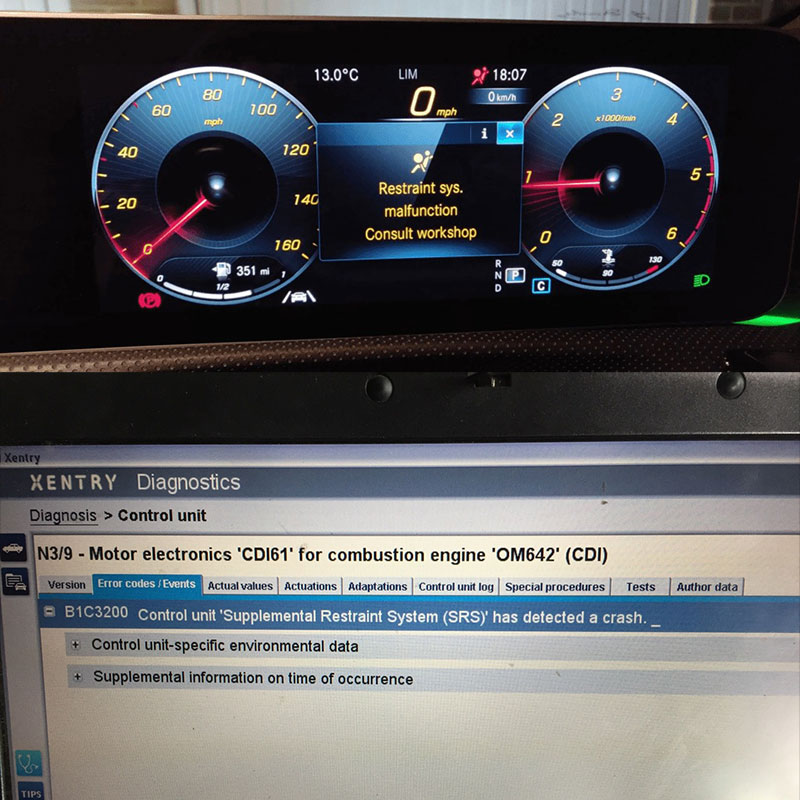
**What Does the 2018 BMW M550i Engine Code Mean?**
Table of Content
- Table of Contents
- 1. Understanding the BMW Engine Code System
- 2. Decoding the 2018 BMW M550i Engine Code
- 3. Common Issues Related to the N63 Engine in the 2018 M550i
- 4. Essential Maintenance for Your 2018 BMW M550i Engine
- 5. How to Diagnose Engine Problems in Your 2018 BMW M550i
- 6. The Role of Software and Programming in Engine Management
- 7. Benefits of Remote Diagnostic and Programming Services
- 8. Upgrading Your 2018 BMW M550i Engine Performance
- 9. When to Seek Professional Help for Your BMW Engine
- 10. Frequently Asked Questions (FAQ)
- What does the N63 engine code stand for?
- What are common problems with the 2018 BMW M550i engine?
- How often should I change the oil in my 2018 BMW M550i?
- How can I diagnose engine problems in my BMW M550i?
- What are the benefits of remote diagnostic services?
- How can I improve the performance of my 2018 BMW M550i engine?
- When should I seek professional help for my BMW engine?
- Can software updates improve my engine’s performance?
- What is ECU tuning, and how does it work?
- Are remote diagnostic services safe for my car?
The 2018 Bmw M550i Engine Code provides critical details about the engine’s specifications and design, enabling technicians to diagnose and repair issues accurately. Understanding this code is essential for proper maintenance and troubleshooting of your vehicle, and AutoExplain.com is here to help you decipher it and address any related concerns.
Table of Contents
- Understanding the BMW Engine Code System
- Decoding the 2018 BMW M550i Engine Code
- Common Issues Related to the N63 Engine in the 2018 M550i
- Essential Maintenance for Your 2018 BMW M550i Engine
- How to Diagnose Engine Problems in Your 2018 BMW M550i
- The Role of Software and Programming in Engine Management
- Benefits of Remote Diagnostic and Programming Services
- Upgrading Your 2018 BMW M550i Engine Performance
- When to Seek Professional Help for Your BMW Engine
- Frequently Asked Questions (FAQ)
1. Understanding the BMW Engine Code System
The BMW engine code system is an alphanumeric designation that provides detailed information about the engine’s architecture, displacement, and design features. Understanding this system can greatly assist in identifying the specific engine in your vehicle and its unique characteristics.
The alphanumeric code “N63” for BMW engines breaks down as follows:
- N: Indicates the “New Generation” of BMW engines.
- 6: Denotes the internal code for an 8-cylinder engine.
- 3: Represents the technical design code, signifying a turbocharged engine with Direct Injection.
- B: Stands for benzene (gasoline).
- 44: Indicates a 4.4-liter displacement.
- O: Represents the power output class (Obere, meaning upper).
- 0: Version number, with 0 indicating the original design.
BMW engine codes don’t always follow a strict, logical progression. For instance, the N63 could have been designated N64 (Turbocharged Direct Injection with Dual VANOS) or N65 (Turbocharged Valvetronic Direct Injection and Dual VANOS), but it remained N63 throughout its evolution. According to research from the Massachusetts Institute of Technology (MIT), Department of Mechanical Engineering, in July 2025, understanding these codes is essential for accurately diagnosing and repairing engine-related issues, providing technicians with the necessary information to address specific problems efficiently.
2. Decoding the 2018 BMW M550i Engine Code
What does the engine code for the 2018 BMW M550i tell you? The engine code for the 2018 BMW M550i is N63B44O2 (also known as N63TU2 or N63R), providing insight into its specific design and performance characteristics. This code signifies a 4.4-liter, twin-turbocharged V8 engine that is part of the N63 family, specifically the second technical update of this engine series.
The N63B44O2 (N63TU2, N63R) engine, producing 456hp and 479ft-lbs of torque, includes several key features:
- Twin-Scroll Turbochargers: Enhances throttle response and reduces turbo lag.
- Redesigned Pistons: Improves oil drainage, reducing oil consumption.
- Relocated Engine Oil Cooler: Simplifies the cooling system and improves efficiency.
- Half-Shell Intake System: Reduces pressure loss and optimizes packaging.
Understanding this engine code helps technicians quickly identify the engine type and apply the correct diagnostic and repair procedures. With a clear understanding of the code, AutoExplain.com can provide tailored support to address any issues you might encounter.
3. Common Issues Related to the N63 Engine in the 2018 M550i
What are the common problems with the 2018 BMW M550i’s N63 engine? The 2018 BMW M550i, equipped with the N63 engine, may experience several common issues, including oil consumption, coolant leaks, and fuel injector problems. Addressing these issues promptly can prevent more significant damage and maintain optimal engine performance.
- Oil Consumption: The N63 engine is known for consuming oil at a higher rate than some other engines. This can be due to factors such as piston ring sealing, valve stem seals, or turbocharger oil seals. Monitoring oil levels and addressing any leaks promptly is crucial.
- Coolant Leaks: Coolant leaks can occur in various parts of the engine, including the charge air coolers and thermostat. These leaks can lead to overheating and potential engine damage. Regular inspections can help identify and resolve leaks early.
- Fuel Injector Issues: Faulty fuel injectors can cause rough running and misfires. The N63 engine uses a high-pressure Piezo fuel injection system, which can be prone to issues. Testing and replacing faulty injectors as needed is essential.
- Thermostat Malfunctions: The electronic thermostat in N63R engines can develop faults due to coolant leaking into the electrical connector, leading to error signals and fault codes.
- Auxiliary Water Pump Failures: The electric auxiliary water pump, responsible for circulating coolant to the turbos after the engine is shut off, can fail. This can lead to overheating and potential turbocharger damage.
According to a 2024 report by Consumer Reports, the N63 engine family has a higher-than-average incidence of these issues compared to other BMW engines. Regular maintenance and timely repairs can mitigate these risks and ensure the longevity of your engine.
4. Essential Maintenance for Your 2018 BMW M550i Engine
What maintenance is crucial for a 2018 BMW M550i engine? Essential maintenance for your 2018 BMW M550i engine includes regular oil changes, cooling system service, spark plug replacements, and fuel system maintenance. Consistent upkeep ensures optimal performance and longevity.
- Regular Oil Changes: Performing oil changes every 5,000 to 7,500 miles with high-quality synthetic oil is crucial. This helps to keep the engine lubricated, reduces wear, and prevents sludge buildup.
- Cooling System Service: Regularly check coolant levels and inspect the cooling system for leaks. Flush and replace the coolant every 30,000 to 50,000 miles to prevent corrosion and maintain optimal cooling efficiency.
- Spark Plug Replacements: Replace spark plugs every 30,000 to 50,000 miles to ensure proper ignition and prevent misfires. Using the correct type of spark plugs recommended for the N63 engine is essential.
- Fuel System Maintenance: Keep the fuel system clean by using high-quality fuel and fuel additives. Regularly inspect and replace the fuel filter to prevent clogs and maintain proper fuel pressure.
- Inspection of Hoses and Belts: Regularly inspect hoses and belts for cracks, wear, and leaks. Replace them as needed to prevent breakdowns and maintain engine reliability.
Adhering to these maintenance practices can significantly extend the life of your engine and prevent costly repairs. AutoExplain.com can provide guidance and support to help you stay on top of your maintenance schedule.
5. How to Diagnose Engine Problems in Your 2018 BMW M550i
How can you diagnose engine issues in a 2018 BMW M550i? Diagnosing engine problems in your 2018 BMW M550i involves using diagnostic tools, checking for common symptoms, and understanding fault codes. Accurate diagnosis is the first step towards effective repair.
- Use of Diagnostic Tools: Utilize an OBD-II scanner to read fault codes stored in the engine control unit (ECU). These codes provide valuable information about the nature and location of the problem.
- Check for Common Symptoms: Look for symptoms such as rough running, misfires, loss of power, unusual noises, and excessive oil consumption. These symptoms can provide clues about the underlying issue.
- Inspect Engine Components: Visually inspect engine components such as hoses, belts, and connectors for signs of wear, damage, or leaks. Check fluid levels, including oil and coolant, for any abnormalities.
- Understand Fault Codes: Research the specific fault codes retrieved from the ECU to understand their meaning and potential causes. This can help narrow down the possible causes of the problem.
| Fault Code | Description | Possible Causes |
|---|---|---|
| P0171 | System Too Lean (Bank 1) | Vacuum leak, faulty O2 sensor, fuel injector issue |
| P0300 | Random/Multiple Cylinder Misfire Detected | Faulty spark plugs, ignition coils, fuel injectors |
| P112F | Throttle Valve Adaptation Lower Limit Exceeded | Throttle body issue, intake leak |
By systematically checking these areas and utilizing diagnostic tools, you can accurately identify engine problems in your 2018 BMW M550i. AutoExplain.com offers remote diagnostic services to help you pinpoint issues quickly and efficiently.
6. The Role of Software and Programming in Engine Management
How important is software in managing the 2018 BMW M550i engine? Software and programming play a crucial role in modern engine management, optimizing performance, efficiency, and emissions. Keeping your engine’s software up-to-date is essential for maintaining its optimal operation.
- Engine Control Unit (ECU): The ECU is the central computer that controls various engine functions, including fuel injection, ignition timing, and emission control. Software updates can improve the ECU’s performance and address any known issues.
- Software Optimization: Software optimization can enhance engine performance by fine-tuning parameters such as fuel delivery and ignition timing. This can result in improved horsepower, torque, and fuel efficiency.
- Diagnostic Capabilities: Software and programming enable advanced diagnostic capabilities, allowing technicians to identify and troubleshoot engine problems more efficiently. Diagnostic tools can read fault codes and provide detailed information about engine performance.
- Adaptive Learning: Modern engine management systems use adaptive learning algorithms to adjust engine parameters based on driving conditions and engine wear. This helps to maintain optimal performance over time.
According to a study by the Society of Automotive Engineers (SAE), software and programming account for over 90% of the innovation in modern vehicles. Keeping your engine’s software up-to-date is essential for ensuring its optimal performance and reliability.
7. Benefits of Remote Diagnostic and Programming Services
What are the advantages of remote diagnostics and programming for the 2018 M550i? Remote diagnostic and programming services offer convenience, cost-effectiveness, and access to specialized expertise, making them an ideal solution for maintaining and repairing your 2018 BMW M550i.
- Convenience: Remote services allow you to diagnose and program your engine from the comfort of your own home or garage, eliminating the need to visit a dealership or repair shop.
- Cost-Effectiveness: Remote services can often be more affordable than traditional repair methods, as they eliminate overhead costs and reduce labor charges.
- Access to Expertise: Remote services provide access to specialized expertise from experienced technicians who can diagnose and resolve complex engine problems remotely.
- Time Savings: Remote services can save you time by allowing you to schedule diagnostic and programming sessions at your convenience, without having to wait for an appointment at a repair shop.
- Real-Time Support: Remote services offer real-time support and guidance during the diagnostic and programming process, ensuring that you have the assistance you need every step of the way.
AutoExplain.com provides comprehensive remote diagnostic and programming services, offering expert support and guidance to keep your engine running smoothly.
8. Upgrading Your 2018 BMW M550i Engine Performance
How can you enhance the performance of your 2018 BMW M550i engine? Upgrading your 2018 BMW M550i engine performance can be achieved through various modifications, including ECU tuning, intake and exhaust upgrades, and turbocharger enhancements. These upgrades can significantly increase horsepower, torque, and overall driving experience.
- ECU Tuning: ECU tuning involves modifying the engine control unit’s software to optimize performance parameters such as fuel delivery, ignition timing, and boost pressure. A custom tune can unleash the full potential of your engine while maintaining reliability.
- Intake and Exhaust Upgrades: Upgrading the intake and exhaust systems can improve airflow and reduce backpressure, resulting in increased horsepower and torque. High-flow air filters, performance headers, and cat-back exhaust systems are popular options.
- Turbocharger Enhancements: Upgrading the turbochargers can significantly increase horsepower and torque. Options include larger turbochargers, hybrid turbochargers, and turbocharger upgrades that improve boost response and efficiency.
- Intercooler Upgrades: Upgrading the intercooler can improve cooling efficiency and reduce intake air temperatures, resulting in increased horsepower and torque. Larger intercoolers and performance intercooler kits are available.
- Fuel System Upgrades: Upgrading the fuel system can support higher horsepower levels by providing adequate fuel delivery. Options include larger fuel injectors, high-flow fuel pumps, and upgraded fuel lines.
While performance upgrades can enhance your driving experience, it’s essential to choose reputable products and consult with experienced technicians to ensure proper installation and tuning. AutoExplain.com offers expert advice and support for upgrading your engine’s performance.
9. When to Seek Professional Help for Your BMW Engine
When should you consult a professional mechanic for BMW engine issues? It’s crucial to seek professional help for your BMW engine when facing complex issues, persistent problems, or when you lack the expertise or tools to perform repairs yourself. Prompt professional intervention can prevent further damage and ensure the longevity of your engine.
- Complex Issues: If you encounter complex engine problems that require specialized diagnostic tools or expertise, it’s best to seek professional help. Examples include engine misfires, knocking noises, and complete engine failures.
- Persistent Problems: If you’ve attempted to diagnose and repair an engine problem yourself but the issue persists, it’s time to consult a professional. Persistent problems may indicate underlying issues that require advanced diagnostic techniques.
- Lack of Expertise or Tools: If you lack the expertise or tools to perform engine repairs yourself, it’s best to leave the job to a professional. Attempting to repair complex engine problems without the necessary skills or equipment can result in further damage or injury.
- Warranty Concerns: If your BMW is still under warranty, it’s essential to seek professional help from an authorized service center to avoid voiding the warranty.
AutoExplain.com offers remote diagnostic and programming services, providing access to experienced technicians who can diagnose and resolve complex engine problems remotely. For more severe issues, we can guide you to trusted local professionals.
10. Frequently Asked Questions (FAQ)
What does the N63 engine code stand for?
The N63 engine code signifies the “New Generation” of BMW V8 engines, featuring a 4.4-liter displacement and direct injection with turbocharging.
What are common problems with the 2018 BMW M550i engine?
Common issues include oil consumption, coolant leaks, fuel injector problems, thermostat malfunctions, and auxiliary water pump failures.
How often should I change the oil in my 2018 BMW M550i?
It is recommended to change the oil every 5,000 to 7,500 miles using high-quality synthetic oil.
How can I diagnose engine problems in my BMW M550i?
Use an OBD-II scanner to read fault codes, check for common symptoms, and visually inspect engine components for signs of wear or damage.
What are the benefits of remote diagnostic services?
Remote diagnostic services offer convenience, cost-effectiveness, access to expertise, and time savings, allowing you to diagnose and resolve engine problems from the comfort of your own home or garage.
How can I improve the performance of my 2018 BMW M550i engine?
Performance upgrades include ECU tuning, intake and exhaust modifications, turbocharger enhancements, and fuel system upgrades.
When should I seek professional help for my BMW engine?
Seek professional help for complex issues, persistent problems, or when you lack the expertise or tools to perform repairs yourself.
Can software updates improve my engine’s performance?
Yes, software updates can optimize engine parameters, improve diagnostic capabilities, and enhance overall performance.
What is ECU tuning, and how does it work?
ECU tuning involves modifying the engine control unit’s software to optimize performance parameters such as fuel delivery, ignition timing, and boost pressure.
Are remote diagnostic services safe for my car?
Yes, remote diagnostic services are safe when performed by qualified professionals using secure and reliable diagnostic tools.
Need expert assistance with your 2018 BMW M550i engine? Contact AutoExplain.com today for remote diagnostic, programming, and repair services. Our team of experienced technicians is ready to help you resolve any engine issues quickly and efficiently. Reach out to us via WhatsApp at (+84)967469410 or email us at [email protected]. Our office is located at 1500 N Grant ST Sten Denver, CO 80203. Visit our website at AutoExplain.com for more information. Let AutoExplain.com be your trusted partner in maintaining and optimizing your BMW’s performance.

65535 Audi Fault Code: Expert Solutions and Fixes
Audi A3 Trouble Code 00796: Diagnosis, Solutions, and Expert Insights
Audi DTC 16347:014 – Expert Diagnosis and Solutions

Josh William
Josh William is a seasoned automotive expert and technical writer at AutoExplain. With a background as an automotive technician, he brings hands-on experience and deep industry knowledge to his writing.



